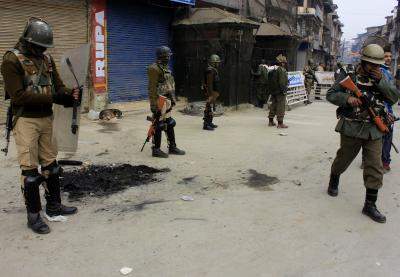National Conference moves SC against Centre’s decision on Article 370

Photo: IANS
Photo: IANS
New Delhi (2 MIN READ): The National Conference has moved the Supreme Court challenging the revoking of the special status of Jammu and Kashmir in the Constitution and reorganization of the state into two Union Territories, Jammu & Kashmir and Ladakh.
Parliament on August 6 passed a resolution supporting the presidential order scrapping the provisions of the Article 370, thus making it redundant.
The National Conference, a regional party of the erstwhile state, has been at the forefront opposing the Centre’s decision on J&K. The party has referred it unconstitutional and also threatened to fight it to the last bit legally.
NC leaders, Mohammad Akbar Lone and Hasnain Mahsood, moved the apex court, representing the party. Omar Abdullah, National Conference leader, has said the presidential order would lead into dangerous consequences and apparently indicated at civil unrest that could potentially engulf the Valley.
The petition seeks the top court’s response to “whether the Union Government can unilaterally unravel this unique federal scheme, under cover of President’s Rule, while undermining crucial elements of due process and the rule of law. This case therefore, goes to the heart of Indian federalism, democratic processes and the role of the Supreme Court as the guardian of the federal structure”.
The petition contended that framers of the Constitution advocated for a pluralistic federal model. Article 370 was extensively considered and carefully drafted in order to ensure the peaceful and democratic accession of the formerly princely state of Jammu and Kashmir to the Indian Union, contended the petition, identifying the significance of Article 370, defining and regulating the relationship between J&K and the Union of India.
“The Constituent Assembly of Jammu and Kashmir drafted a Constitution for the state, specifically recognising that Jammu and Kashmir was an integral part of the Union. Crucially, the existence of the Constituent Assembly of Jammu and Kashmir is recognised in the scheme of Article 370,” contended the petition claiming the Presidential Order and Jammu and Kashmir Reorganisation Act unconstitutionally undermine the scheme of Article 370.
Citing Swaraj or self-governance, the petition said the right to autonomous self-government within a federal framework is an essential fundamental right. These valuable rights have been taken away without the “procedure established by law” in a manner that violates every canon of Constitutional morality.
The petitioners urged the apex court to declare presidential order unconstitutional, void and inoperative.
Under Article 370, the state of Jammu and Kashmir had autonomy and the Legislative Assembly was free to draft its own laws except in the areas of communication, defence, finance, and foreign affairs. People from outside were prohibited from purchasing land in the state.
Published on: Aug 10, 2019 at 16:04 IST
IANS




